Visiting Chichén Itzá: Price and Other Tourist Information You Need to Know

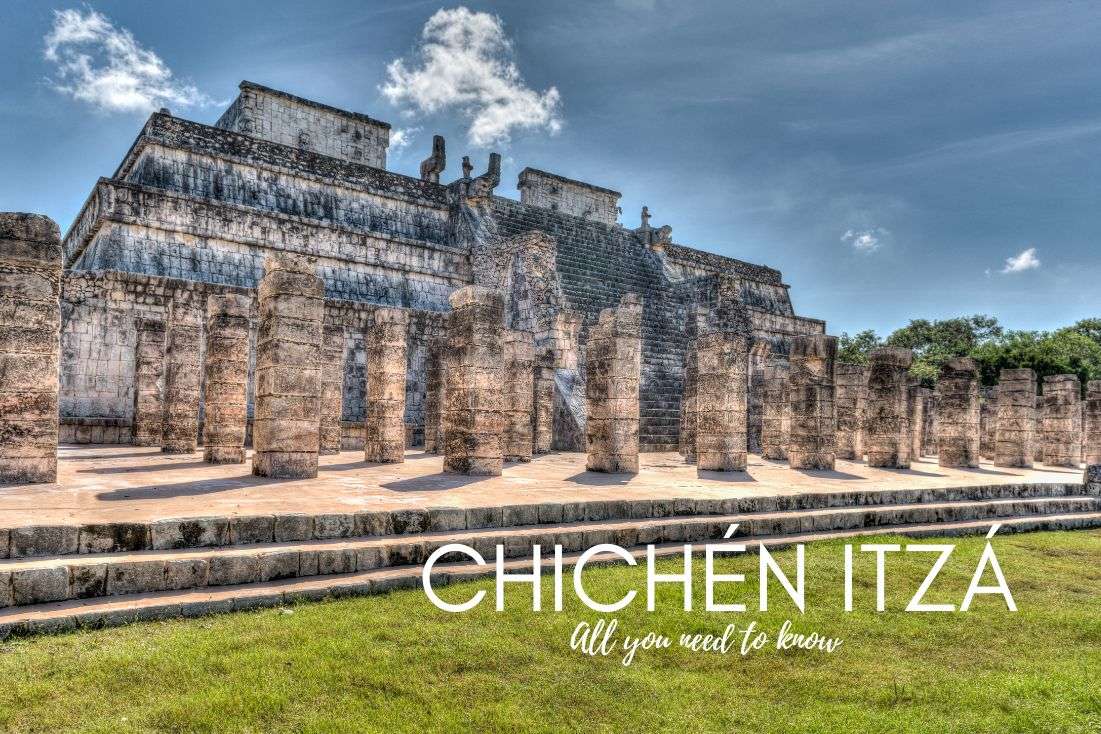
Being on the list of the New 7 Wonders of the World, Chichén Itzá attracts tourists from all over the world. The majestic pyramids, temples, and other monuments almost make one wonder: How the heck did the Maya build it? To find it out, hit the road and get ready for exploring the ancient ruins on your own—with our Chichén Itzá travel guide including all tourist information you need to know.
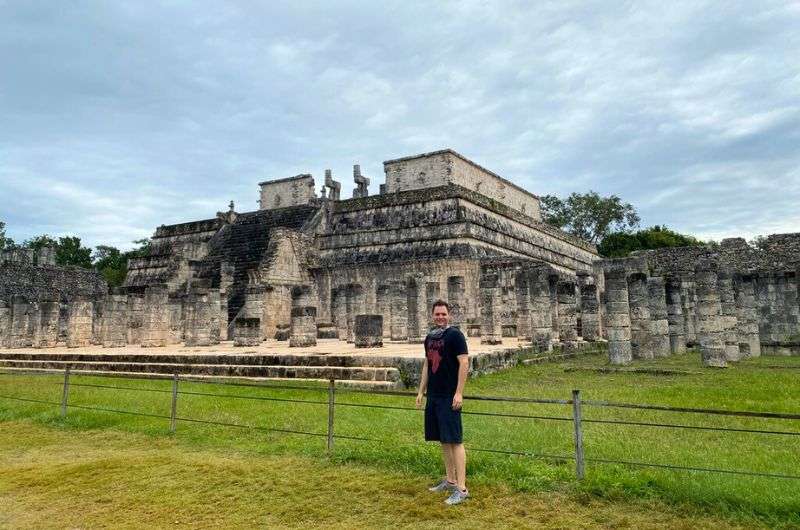
Chichen Itzá is full of historical ruins
You might also be interested in reading:
- Yucatán Itinerary—2 Weeks Full of the Best Places to Visit
- Safety in Mexico—Is It Safe to Travel There?
- The Best Food in Mexico: 11 Things You Should Try + 3 You Shouldn’t
- 7 Best Aztec Ruins in Mexico
- 33 Mexico Travel Tips from Our Own Experience
Chichén Itzá is the new wonder of the world
At the beginning of the millenium, people realized that the list of Seven Wonders was pretty outdated—most of the wonders didn’t even stand. So they launched a vote. 100 million people took part, and in 2007, the list of New World Wonders saw the light of day. Chichén Itzá was among them.
(Just in case you wonder, the others are: Machu Picchu, Taj Mahal, Petra, Colosseum, Christ the Redeemer, and the Great Wall of China.)
Being one of the seven most impressive sites in the whole world is a reason enough for a visit, isn’t it?
Chichén Itzá: History
Chichén Itzá was founded in the 5th century AD by one of the tribes of the Maya people: the Itzá. They settled in the area because of two water sources in the nearby sinkholes. Yucatan was a dry piece of land back in the day, and access to water was key to survival. That’s how the word Chichén in the site’s name originated: chi means “mouths” and chen means “wells”.
In the 10th century, Toltec warriors arrived, conquered the city, and left their mark on the architectural style of the buildings. Different techniques and elements mingle and create an unchangeable fusion of Mayan and Toltec cultures in Chichén Itzá.
35 thousand inhabitants then, 2.6 million tourists now
At its peak between 900 and 1050 AD, Chichén Itzá was a powerful capital of Yucatan with 35,000 inhabitants. (For comparison, Paris and London had 20,000 inhabitants then.) The city used a nearby harbor to trade with gold and obsidian, securing its position as an economic empire. To add on, it was a religious, political, and military center as well. (I imagine the life there must have been splendid. Unless you were sacrificed. That must have sucked. But we’ll get to the human sacrifices later.)
Unfortunately, the future was bleak for Chichén Itzá and its people. Another Maya tribe, ruled by the infamous Hunac Ceel Cauich, conquered the city. But before we move on, here’s the story of Hunac Ceel Cauich:
Hunac Ceel Cauich fought the Itzá, but they won and took him captive. The million-dollar question is: What do you do with your enemies taken captive?
a) You set them free.
b) You hold them in a prison.
c) You throw them in a giant hole to sacrifice them to the gods.
c) is right. The Itzá threw Hunac in one of the sinkholes nearby, filled with water. But he kept swimming the whole night and survived. When the Itzá saw it, they believed he was chosen by the gods, and set him free. He became the lord of Mayapan, another Maya city near Chichén Itzá. Full of hatred towards the Itzá, he attacked again—and this time, he won.
After the conquest, Chichén Itzá quickly declined, and the ruins were excavated a few centuries later, in 1841. The National Institute of Anthropology and History takes care of the site now, and welcomes 2.6 million tourists yearly.
Tip: You can read more about the history of Mexico in my article with 12 things you should know about the country before you hit the road.
What you need to know about visiting Chichén Itzá
- 2.6 million tourists don’t go without queues. Long, tedious queues, to be more precise. You can skip them by booking your tickets online here.
- Don’t expect one of the largest cities of its time to be small. Chichén Itzá is a spacious complex, and I recommend spending at least 3–5 hours there.
- Many things are dirt cheap in Mexico. Chichén Itzá is not among them. Get ready to pay 533 Mexican pesos (27 US dollars) per person.
- Chichén Itzá is not open forever. Plan your visit to fit the opening hours: 8 AM – 5 PM daily, the last entrance at 4 PM
Traveling to Chichén Itzá: How to get there
Chichén Itzá is located on the Yucatan Peninsula, approximately halfway between Mérida and Cancún. The best way to get there is to go by car from one of them.
- If you go from Mérida, you’ll see a big green sign navigating you to Chichén Itzá just a while after you drive through the town of Pisté. Hundreds of cars park along the road and in the enormous parking lot it leads to.
- If you go from Cancún, a green sign will navigate you in a sharp turn left approximately 900 meters (3,000 feet) in front of Pisté. It’s the same road for both directions, so expect to find plenty of cars in the parking lot.
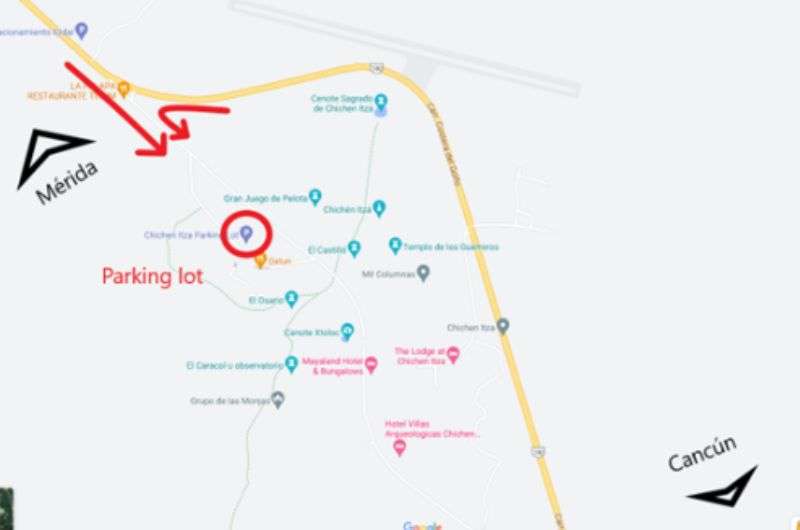
This is how you get there!
Guide to Chichén Itzá: 4 sites you shouldn’t miss
Chichén Itzá is full of incredible buildings and monuments. These four shouldn't escape your notice:
1. The most famous Chichén Itzá pyramid: the Temple of Kukulcán
The most famous Chichén Itzá pyramid, called El Castillo (The Castle) and known as The Temple of Kukulcán, was built between 800 and 1200 AD. It’s 30 meters (98 feet) high, and 55.3 meters (181 feet) wide in its base.
It’s devoted to the deity known as Kukulcán, the feathered snake. Despite the fact that Kukulcán was also called The War Snake, it supposedly spread peace and communication among people of different ethnicities. Quite a modern snake, wasn’t it?
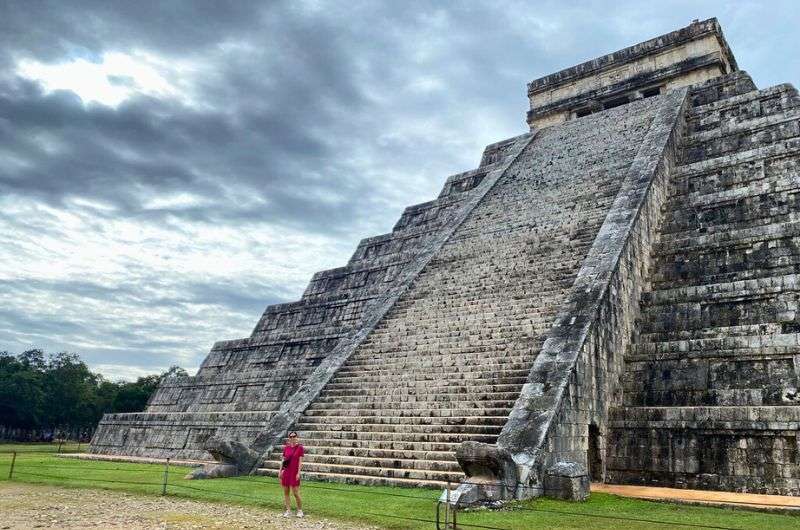
The Temple of Kukulcán
The Maya were cunning manipulators back in the day, using their knowledge of astrology to control their folk. The Temple of Kukulcán helped them do that. How?
The sides of the main staircase are actually sculptures of a plumed serpent. On equinoxes, the light runs down the sculptures creating the illusion of a snake winding down its way. The ruler of Chichén Itzá knew that, stood on the staircase when it was the right time, amazed his subjects by the illusion, and claimed it was the proof he was the messenger of the god. Yes, cunning. I know.
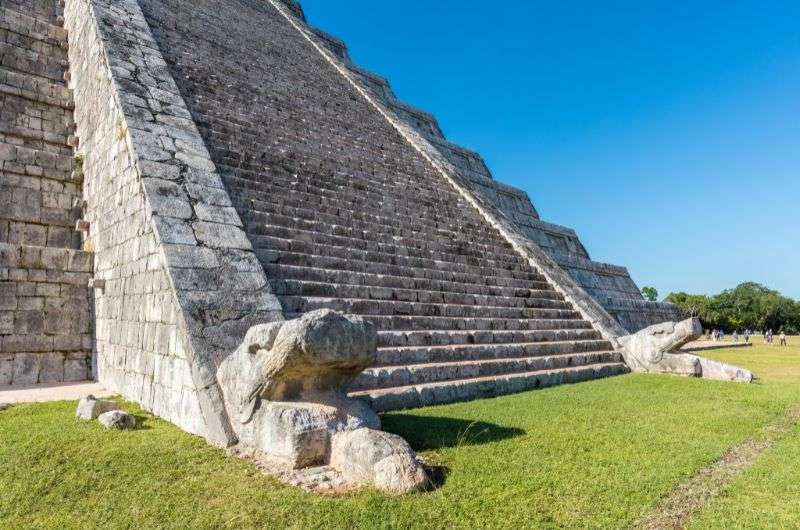
You can see the snakes on both sides when you walk the staircase of Kukulcán
Another notable feature of the temple, proving the genius of the Maya, is that it has exactly 365 stairs, representing the 365 days in a year, and nine platforms, representing the nine levels of the underworld.
2. The Colonnade (Thousand Columns)
The Colonnade is a thousand columns without a roof. Of course, they used to have a roof—supposedly thatched or wooden. They were probably part of a small temple or meeting halls, built between 900 and 1200 AD. Carvings of people, gods, animals, and especially snakes are still preserved on some of them.
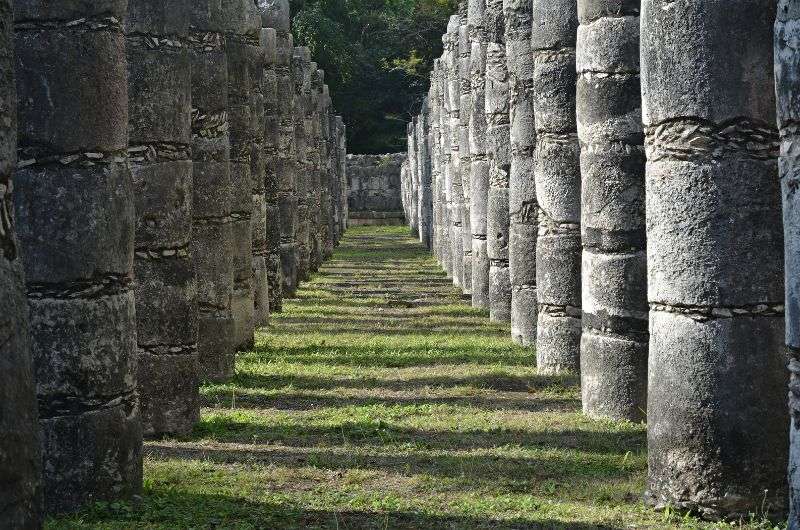
The Colonnade of Thousand Columns
3. The Great Ball Court
Baseball? Football? Ice-hockey? All of them are lame. It’s the Maya ball game that rocks. The ball game, called tlachtli, was played by the Maya all over their realm. That’s why you can find these gigantic courts in almost every ancient city on Yucatan.
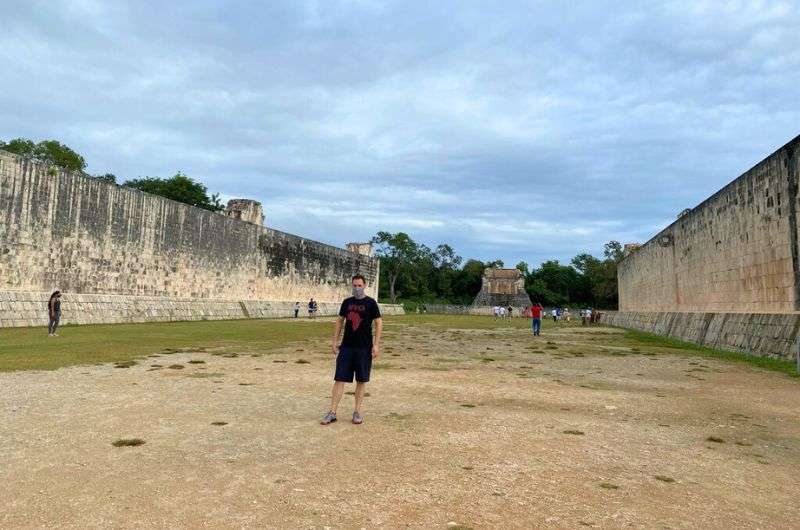
This is where I was imagining I was playing the "tlachtli" Mayan game
The Maya played one on one, in pairs, or in teams. The players used a 3–5 kilograms (6.6–11 pounds) heavy ball made of latex, which they were allowed to touch only with hips and thighs. And that’s kinda all we know about the game.
4. Platform of the Skulls
The Platform of the Skulls (also known as Tzompantli) is a typical example of Toltec architecture in Chichén Itzá. It displays the heads of the dead to memorize them. Often, platforms like this displayed the heads of dead enemies—to scare the living ones.
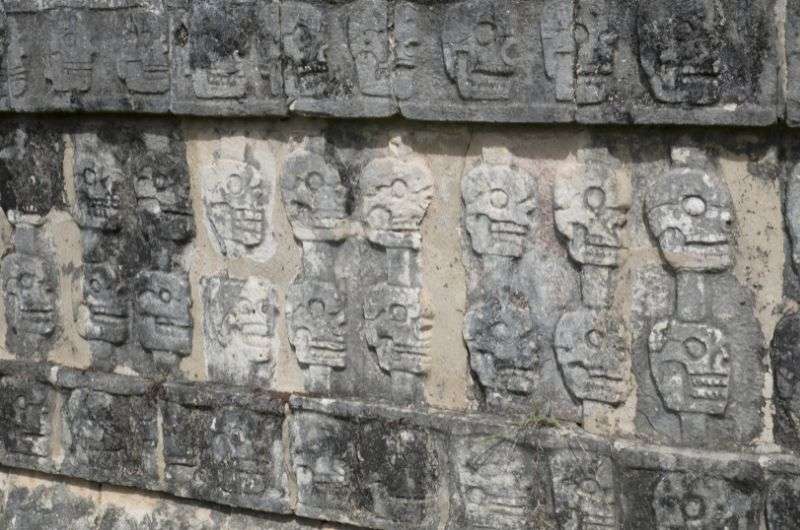
Platform of the Skulls
Tip: If you're into ancient cultures and ruins, you should definitely visit Teotihuacan.
Chichén Itzá and human sacrifices
The people of Chichén Itzá worshipped the gods by throwing things and people into one of the sinkholes, called The Well of Sacrifice. (Remember Hunac Ceel Cauich?) If someone survived, the Maya considered them a prophet. (Considering the fact that the only thing needed to survive was the swimming skill… Well, I think all of us would have been supreme prophets in those times.)
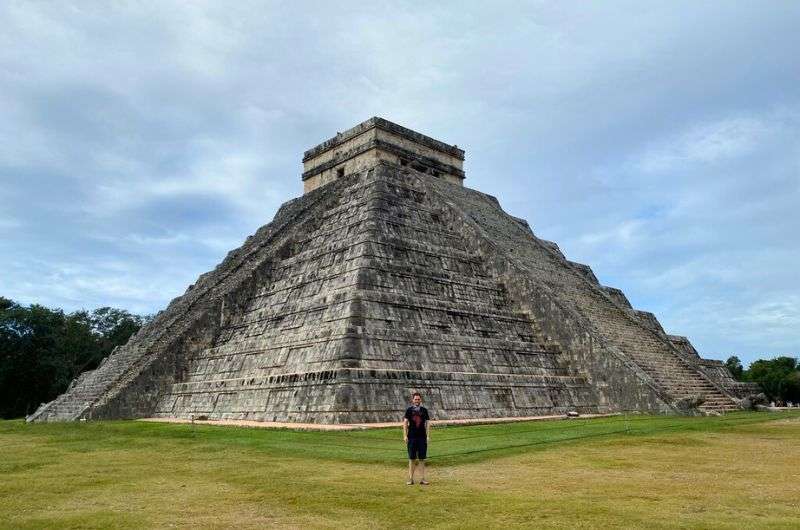
In Chichen Itza you will feel like you have travelled through time to the past
2 things you can do to spice up your visit in Chichén Itzá
Maybe you’re already fed up with ancient ruins in Mexico. In that case, there are two special things you can do in Chichén Itzá to perk up your visit:
1. Kukulcán nights
Even though the gates of Chichén Itzá close at 5 PM, there is a possibility to peek in later. The site organizes night shows at 7 PM—you can buy the tickets (600 Mexican pesos—30 US dollars) at the entrance from 3 PM.
2. Mayan cuisine tour
Chichén Itzá is full of detailed descriptions about Mayan civilization... But why not experience it first-hand? The Mayan cuisine tour includes transport to the ruins, entrance fee, guided tour, buffet lunch, visit to the sinkhole, and an express stop in Valladolid. It costs 1,829 Mexican pesos (92 US dollars).
Enjoy more of Mexico!
Experience the best Mexican vacation of all times thanks to my detailed articles about the best locations in Mexico.
This post may contain affiliate links. We earn a small commission if you make bookings through our links, at no additional cost to you. This helps us keep this blog running, thank you!


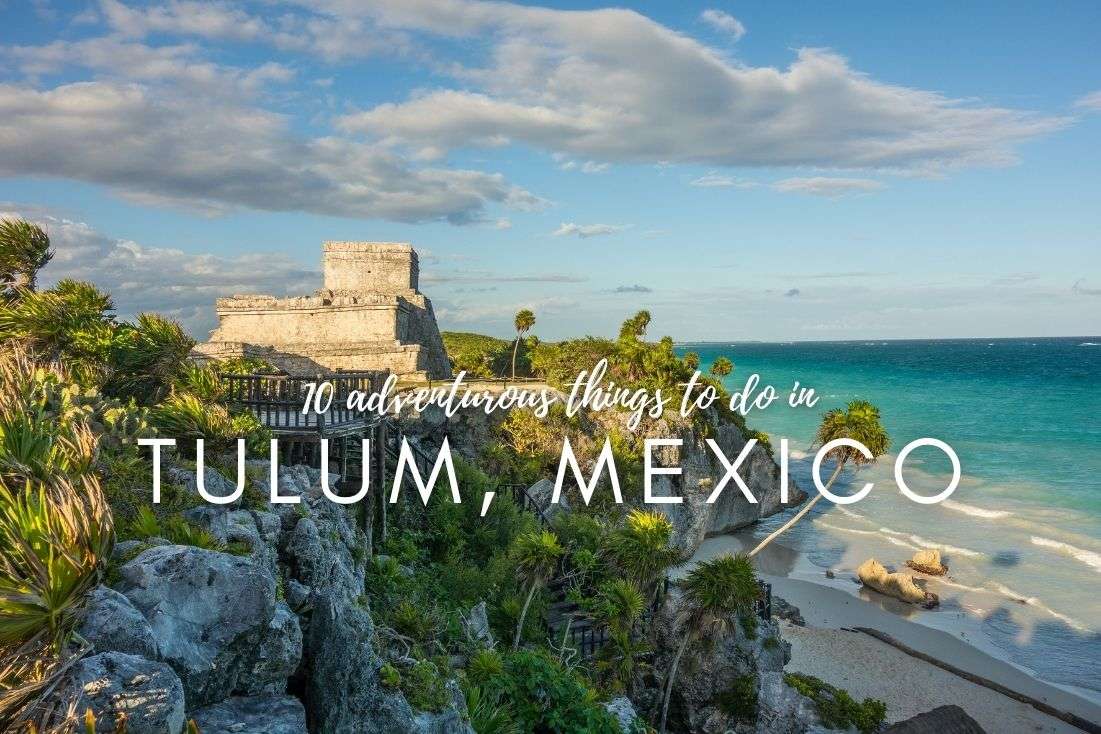
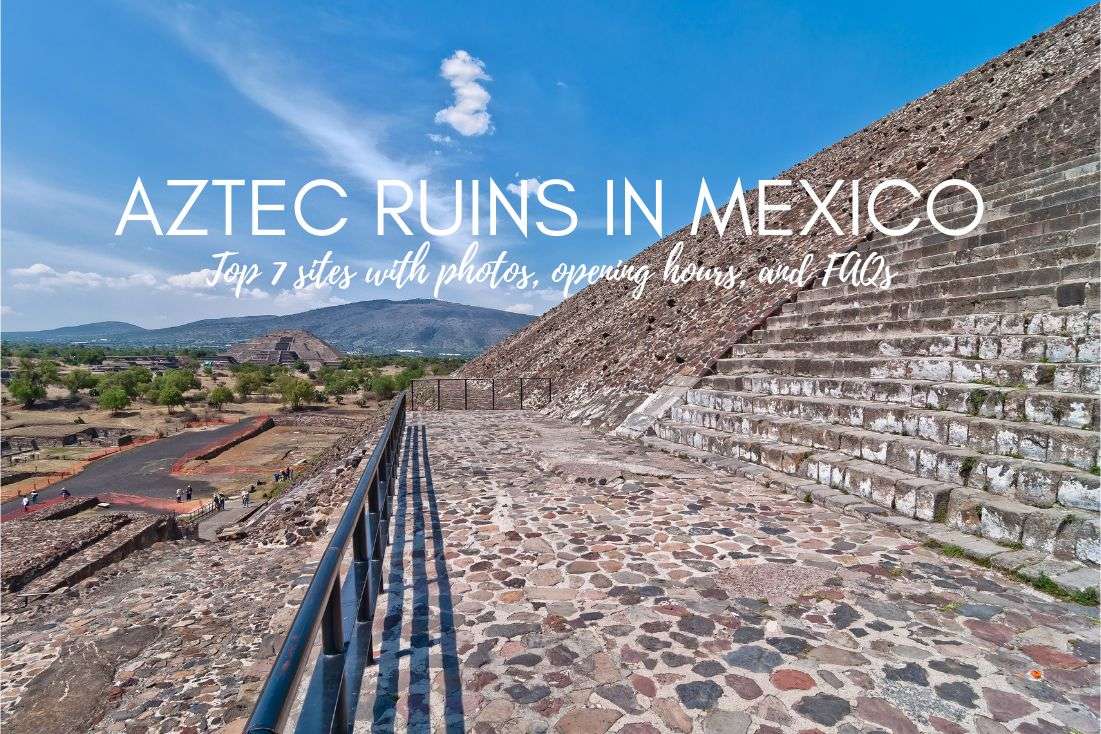






Comments | Thoughts? Give us a shout!